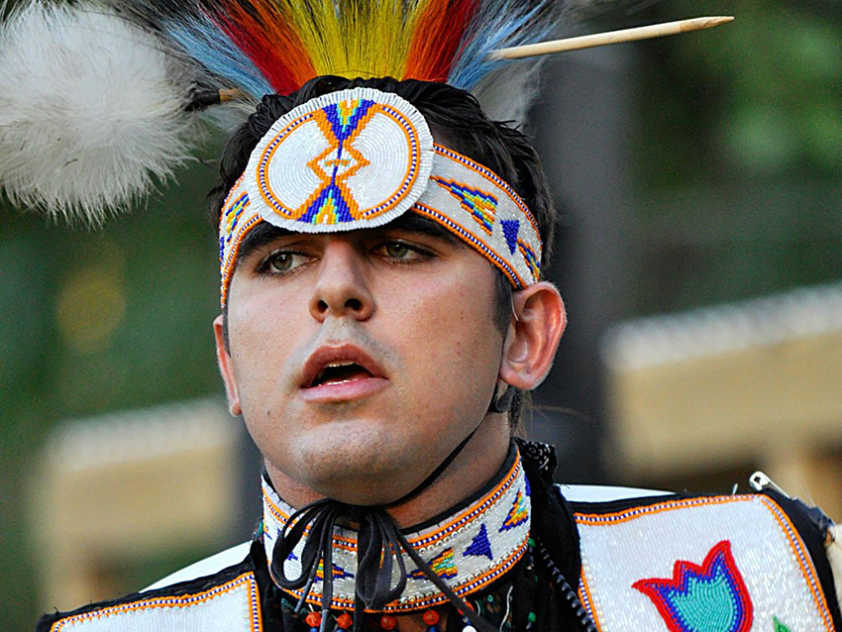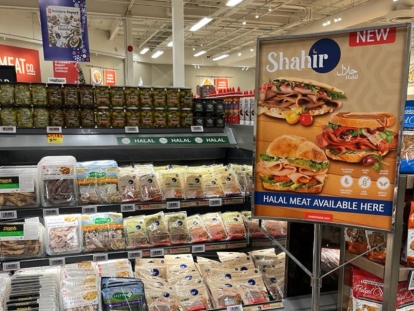 Shady Hafez in men’s traditional regalia at a Pow Wow.
Courtesy of Shady Hafez
Shady Hafez in men’s traditional regalia at a Pow Wow.
Courtesy of Shady Hafez
Jun
Ottawa’s Muslim community is full of uncommon mixed race identities, but Shady Hafez, 25, might be an original. Born in Ottawa, the son of an Algonquin mother from the Kitigan Zibi reservation and a Muslim father from Syria, Shady was raised in two worlds, each misunderstanding of the other, and both misunderstood by mainstream Western culture.
As the author of the recent BuzzFeed article 12 Easy Steps For Canadians To Follow If They’re Serious About Reconciliation, Shady's writing aims to help bridge the gaps between his communities.
Muslim Link interviewed Shady Hafez back in 2014, about how he navigates his identities.
“I was raised by my Syrian grandparents in a traditional Muslim household, but on weekends, I would stay with my mother in Kitigan Zibi,” he explained. When he visited his mother, her family would take him out hunting and fishing and sometimes he would attend Pow Wow, where First Nations communities gather to dance, sing and socialize. “I remember sitting at the drum and singing as a kid,” he shared.
Shady graduated with a double major in Law and Canadian Studies with a minor in Indigenous Studies at Carleton University. He worked as the coordinator of the Aboriginal Student Service Centre at Carleton University where he develops programs to support his fellow Indigenous students. “We try to make them develop a sense that they belong at university, that they are not just the outcasts,” he stated.
It was only in his teens that Shady took a real interest in his Algonquin heritage. He began learning traditional dance and attending Pow Wows across North America. He has now been dancing for eight years. “The outfits we wear are called regalia,” he explained, “There are different styles. The style I wear is men’s traditional which is one of the oldest styles. These dances often originated from male warrior societies.”
Learning about his heritage has also meant learning about his people’s disputes with the Canadian government. Ottawa is currently at the centre of a land dispute as it is considered unceded Algonquin territory. “Unceded means basically that we never signed a treaty with the Canadian government,” he stated, “We never gave up the land for any compensation.”
The Algonquin are one nation amongst several that belong to the Anishinabe language family. “Anishinabe is like saying Arab. Algonquin is like Syrian, Lebanese, Egyptian, all those different Arab countries. So I speak the Algonquin dialect of Anishinabe,” Shady explained.
To understand how the Algonquin lost their territory, you have to go back to the conflict between the English and the French in Canada. According to Shady, “The Algonquin sided with the French. The Iroquois sided with the British. Our community was really decimated by the war and disease. We were displaced by the conflict. When the English won, there was a lot of economic interests in the territory because of lumber, so a lot of land was taken.” One of the few areas that remain in Algonquin hands is the reserve of Kitigan Zibi, about an hour outside of Ottawa near Maniwaki.
Shady often finds it difficult to discuss these issues as many people, including First Nations communities themselves, are not aware of the history. New immigrants also come to the country ignorant of the struggle of the indigenous people. “Any immigrant who has come from a country and was abused by their government should completely understand what is going on here for First Nations people,” stated Shady. He encourages people to go out and get to know First Nations people. “Speak to a First Nations person! Don’t rely on the media because both sides of the media, both left and right, are really twisting things,” he recommended.
Shady admits that being both Algonquin and Syrian has not been easy. “You have two cultures which are just struggling to survive when Western culture is dominating them both, so they are both afraid of losing me,” he explained. But he tries to strike a balance. He has also been heartened to see more members of Ottawa’s Muslim community becoming involved in the local struggles of First Nations communities.
As a young Indigenous leader, Shady also admits being frustrated by many of the decisions of the community’s leadership. “According to an Anishinabe Seventh Fire teaching, in order for this generation to succeed the elders have to let our generation step forward and take on leadership. If the leaders listened to the youth more often, things would get done so much faster,” he said.
Shady feels that he and other indigenous youth are learning leadership lessons from the mistakes of many of the community’s leaders in the wake of some of the disappointments from the Idle No More movement for young indigenous people. “If you say you are going to do something, follow through. If you are going to sit at Parliament and say you are not going to move, then don’t move in the face of anything. Don’t back down.”
Shady is also the father of a seven year old daughter. He hopes to raise his daughter with an understanding of both sides of his heritage. “I consider myself Muslim,” Shady explained, “I’m probably not the most developed Muslim, but that is what I am and this is what I will teach my daughter, but she will be free to decide what path she wants to live by. I just want her to understand where she comes from and the history of her people because both histories are pretty amazing and something to be proud of.”
To read Shady Hafez's 12 Easy Steps For Canadians To Follow If They’re Serious About Reconciliation, click here
To learn more about Kitigan Zibi website here
To learn more about the Algonquin Land Claim which includes the City of Ottawa visit here
To learn more about the Algonquin people visit here
This article was produced exclusively for Muslim Link and should not be copied without prior permission from the site. For permission, please write to info@muslimlink.ca.
















